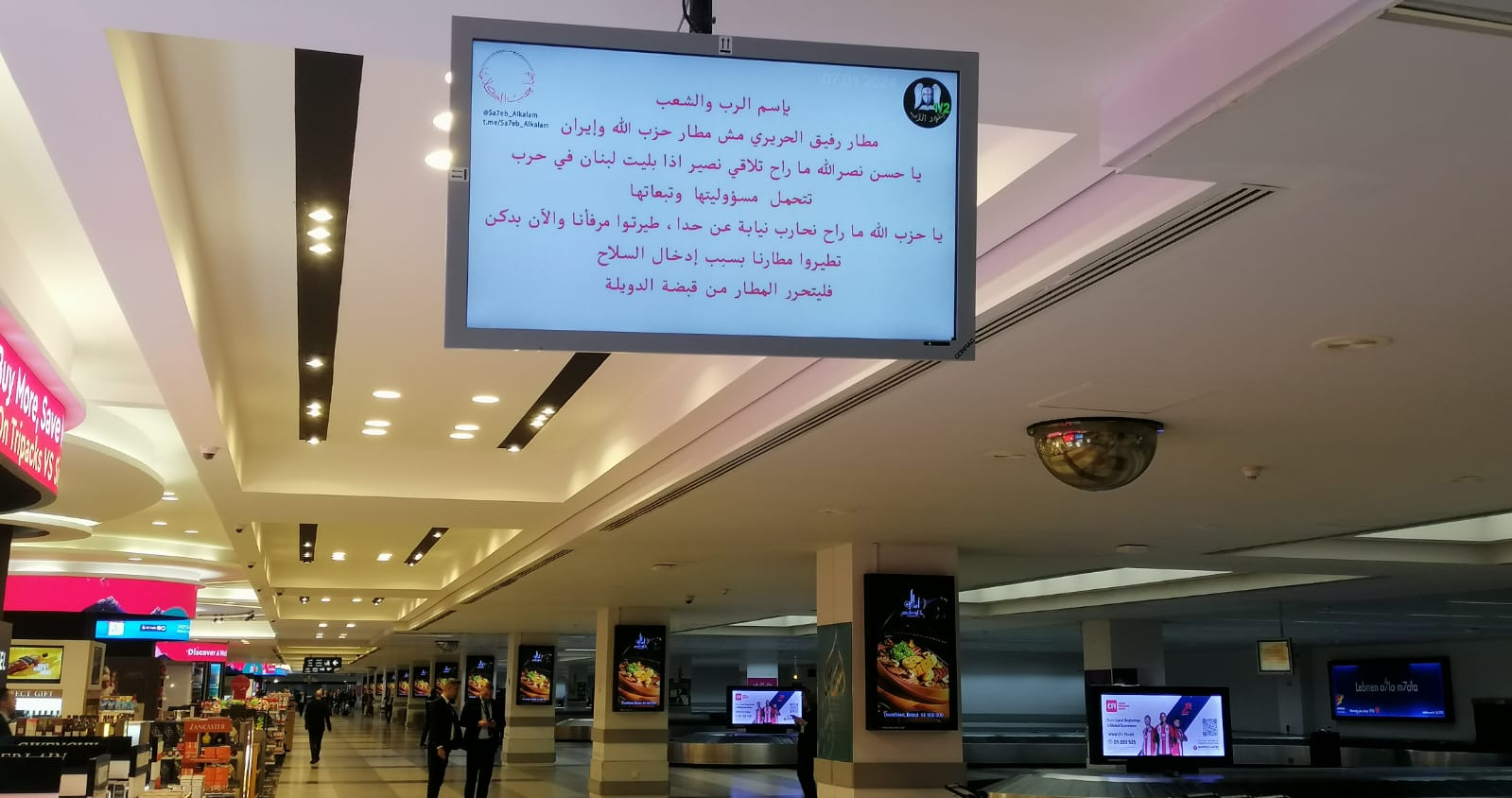News
Beirut Airport Cybersecurity Incident: How It Unfolded
On Sunday January 7, Rafic Hariri International Airport’s screens began displaying political messages instead of flight information.

On Sunday evening, January 7, 2024, Beirut’s Rafic Hariri International Airport experienced a cyber attack that resulted in political messages appearing on its departure and arrival screens, disrupting normal flight information and temporarily halting luggage belt operations.
Lebanon’s Minister of Public Works and Transport, Ali Hamieh, addressed the public the following day, expressing a commitment to uncovering the perpetrators of the incident and reassuring the public that the airport remained fully operational.

Meanwhile, Fadi El-Hassan, Director General of Civil Aviation, reported that the issues with the airport’s screens had been resolved, and normal functionality had been restored across passenger terminals, including arrival and departure halls.
Despite these developments, official statements from Lebanese authorities regarding the incident were yet to be released, as investigations continued under the oversight of the Lebanese security services, as confirmed by Minister Ali Hamieh.
As of now, no information has surfaced regarding the compromise of airport data, such as flight details, passenger records, or other sensitive information. However, technical experts at SMEX, a nonprofit organization dedicated to advancing digital human rights across West Asia and North Africa, say that the severity of the cyberattack reveals clues on the motives behind it.
Also Read: The Largest Data Breaches In The Middle East
Members of SMEX’s technical team raised concerns about the cyber breach, stating, “If the perpetrators were able to manipulate screen content and disrupt the Baggage Handling System (BHS), it indicates the possible presence of malware within the compromised system”.
SMEX’s technical experts have also outlined several conceivable scenarios for the attack:
- The breach may have originated from the airport’s internal network, possibly involving the installation of malicious software by an individual with insider access to the airport’s systems.
- Another possibility is the compromise of an employee’s device through social engineering or a phishing attack, typically delivered via email or other deceptive means.
- An employee with privileged system access might have been coerced or manipulated through blackmail, bribery, or threats, facilitating unauthorized entry into the airport’s systems.
Lebanese authorities have yet to pinpoint the root cause of the airport cyberattack, leaving room for speculation about potential sources, which may include internal, external, or even governmental actors.
News
Alienware Just Announced Six New Gaming Monitors
The new models include three QD-OLED and three budget-friendly QHD options, expanding the company’s lineup for all gamers.

Alienware has just updated its gaming monitor lineup with six new additions, including the highly anticipated Alienware 27 4K QD-OLED Monitor. The latest wave of releases is set to reach more gamers than ever, offering high-end QD-OLED displays alongside more budget-friendly options.
The latest displays clearly show that the company is doubling down on QD-OLED with three new models sporting the technology. A redesigned Alienware 34 Ultra-Wide QD-OLED Monitor is also making a return, further refining what is already a fan-favorite display.
A Unified Design: The AW30 Aesthetic
All six monitors feature Alienware’s new AW30 design language, first introduced at CES. The AW30 aesthetic brings a futuristic, minimalist look that unites the entire lineup under a cohesive visual identity.
Pushing QD-OLED Even Further
The refreshed Alienware 34 Ultra-Wide QD-OLED Monitor (AW3425DW) builds on its predecessor’s success with a 240Hz refresh rate (up from 175Hz) and HDMI 2.1 FRL support. It also gains G-SYNC Compatible certification alongside AMD FreeSync Premium Pro and VESA AdaptiveSync, ensuring ultra-smooth performance. With a WQHD (3440×1440) resolution and an 1800R curve, this display enhances immersion for both gaming and cinematic experiences.
For those who crave speed, the Alienware 27 280Hz QD-OLED Monitor (AW2725D) pairs a high refresh rate with QHD resolution, balancing sharp visuals with ultra-smooth gameplay. Meanwhile, the Alienware 27 4K QD-OLED Monitor (AW2725Q) delivers stunning clarity with an industry-leading pixel density of 166 PPI, making it the sharpest OLED or QD-OLED monitor available.
Also Read: Infinite Reality Acquires Napster In $207 Million Deal
Worried about OLED burn-in? Alienware’s entire QD-OLED lineup comes with a three-year limited warranty covering burn-in concerns, offering peace of mind for gamers investing in these high-end displays.
Bringing QHD To A Wider Audience
Alongside QD-OLED, Alienware is also releasing three new QHD gaming monitors aimed at more price-conscious gamers. The Alienware 34 Gaming Monitor (AW3425DWM), Alienware 32 Gaming Monitor (AW3225DM), and Alienware 27 Gaming Monitor (AW2725DM) provide a range of sizes and formats to suit different preferences:
- The Alienware 34 Gaming Monitor (AW3425DWM): An ultrawide (WQHD) option for a panoramic, immersive experience.
- The Alienware 32 Gaming Monitor (AW3225DM): A standard 16:9 panel for a traditional but expansive desktop setup.
- The Alienware 27 Gaming Monitor (AW2725DM): A 27” display offering the same performance in a more compact form factor.
All three gaming monitors feature a fast 180 Hz refresh rate, a 1ms gray-to-gray response time, and support for NVIDIA G-SYNC, AMD FreeSync, and VESA AdaptiveSync to eliminate screen tearing. Additionally, with 95% DCI-P3 color coverage and VESA DisplayHDR400 certification, these displays deliver vibrant colors and high dynamic range for lifelike visuals.
-

 News3 weeks ago
News3 weeks agoSpace42 & Cobham Satcom Launch New Satellite Broadband Terminal
-

 News3 weeks ago
News3 weeks agoYasmina Smart Speakers Now Feature Ramadan-Specific Content
-

 News3 weeks ago
News3 weeks agoRipple Gains DFSA License To Offer Crypto Payments In Dubai
-

 News2 weeks ago
News2 weeks agoAre You Ready For Hong Kong’s InnoEX & Electronics Fair?



















